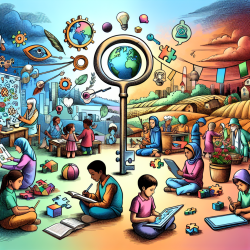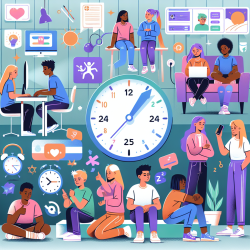As practitioners committed to fostering the development and well-being of children, we continually seek evidence-based strategies to enhance our therapeutic approaches. The research article "Attachment-Based Mentalization Profiles of Iranian Children: A Mixed-Method Approach" offers profound insights that can guide us in improving our practice. This study reveals the significant role of reflective functioning (RF) in children's mental health and underscores the importance of considering cultural and socioeconomic contexts.
Reflective functioning, or mentalization, is the ability to understand and interpret one's own and others' mental states. This skill is foundational for healthy emotional and social development. The study identifies four distinct mentalizing profiles in children: Adaptive Mentalizing, Passive Mentalizing, Helpless Mentalizing, and Self-Focused Mentalizing. Understanding these profiles can help us tailor our interventions more effectively.
Key Findings and Practical Applications
- Adaptive Mentalizing: Children with this profile exhibit mature, deliberate responses to challenging situations. They actively engage in problem-solving and demonstrate resilience. Encouraging parents to foster open communication and provide emotional support can help cultivate this profile.
- Passive Mentalizing: These children struggle to understand and cope with difficult situations, often feeling confused and helpless. Interventions should focus on enhancing emotional regulation skills and providing a supportive environment to build their confidence and coping abilities.
- Helpless Mentalizing: Characterized by a lack of effort to understand or engage with challenging situations, these children often feel isolated and indifferent. Therapeutic strategies should aim to rebuild trust and encourage active participation in social interactions.
- Self-Focused Mentalizing: These children have difficulty considering others' perspectives and may exhibit narcissistic traits. Interventions should emphasize empathy development and the importance of reciprocal relationships.
The study also highlights the impact of socioeconomic status (SES) on mentalizing profiles. Children from higher SES backgrounds are more likely to develop adaptive mentalizing profiles, while those from lower SES backgrounds are more prone to maladaptive profiles. This underscores the need for targeted interventions that address the unique challenges faced by children from low-SES families.
Encouraging Further Research
While this study provides valuable insights, it also points to the need for further research in diverse cultural contexts. Understanding how different environments influence mentalization can help us develop more effective, culturally sensitive interventions. Practitioners are encouraged to explore cross-cultural studies and contribute to this growing field of research.
In conclusion, integrating the findings from "Attachment-Based Mentalization Profiles of Iranian Children: A Mixed-Method Approach" into our practice can significantly enhance our ability to support children's mental health and development. By fostering adaptive mentalizing skills and addressing the challenges posed by socioeconomic disparities, we can help children navigate their emotional and social worlds more effectively.
To read the original research paper, please follow this link: Attachment-Based Mentalization Profiles of Iranian Children: A Mixed-Method Approach.










